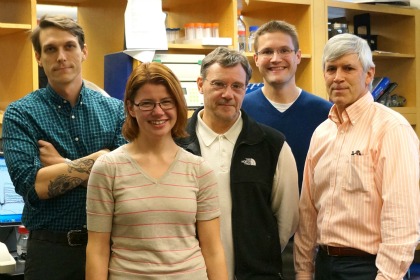Synthetic Molecules That ‘Rescue’ Damaged Arteries and May Treat PH Developed in Lab

UVM researchers (from left ) Thomas Moon, PhD; Jessica Sheehe, graduate student; Wolfgang Dostmann, PhD; Nathan Tykocki, PhD; and Joseph Brayden, PhD (Photo: UVM COM Design & Photography)
In a new study, researchers at the University of Vermont developed a set of synthetic molecules that can successfully modulate the protein kinase 1alpha (PKG 1α), known to be involved in smooth muscle contraction. The protein is a potential therapeutic target for a range of conditions, including pulmonary hypertension.
A U.S. patent was also recently granted for the development of these molecules, which is a first step in the design of pharmaceutical agents. The research, by senior author Professor Dr. Wolfgang Dostmann and his team, is detailed in the article “Synthetic Peptides as cGMP-Independent Activators of cGMP-Dependent Protein Kinase Iα,” published in the journal Cell Chemical Biology.
While studying the atomic structure of the major target for the enzyme cGMP, which is PKG 1α, the team found that the enzyme could be regulated by a series of synthetic molecules besides its natural activator (molecule GMP). Such molecules, designed and synthesized by the team, were named S-tides and found to modulate with great specificity the activity of PKG, a subtype critical for arterial relaxation and blood pressure regulation.
Experiments with arteries recovered from animal models showed that S-tides activated components of the PKG activation cascade, and prevented pressure-induced vessel constriction. This important signaling pathway is also the target of other known drugs, such as Viagra and Adempas, the latter a treatment for pulmonary hypertension. However, these drugs act to preserve intracellular cGMP molecules at an elevated level. In contrast, S-tides do not have an effect on the endogenous level of cGMP.
The S-tides molecules may have broad therapeutic applicability, as the type 1α cGMP-dependent PKG pathway has been shown to be relevant in conditions like pulmonary hypertension, high blood pressure, cancer, obesity, chronic obstructive pulmonary disease (COPD), and all forms of cardiovascular disease.
Importantly, the researchers found that these molecules only affected small arterial vessels that presented arterial dysfunction. “The peptides rescue the damaged vessels, but they have no effect on the healthy vessels,” said Professor Dostmann in a university news release. “This therapeutic pathway has huge potential for the average person, since about 30 percent of people develop hypertension or cardiovascular disease in their lifetime.”







